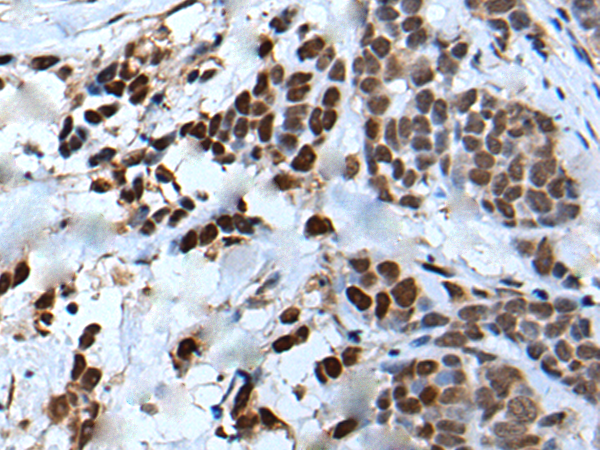
| WB | 咨询技术 | Human,Mouse,Rat |
| IF | 咨询技术 | Human,Mouse,Rat |
| IHC | 1/30-1/150 | Human,Mouse,Rat |
| ICC | 技术咨询 | Human,Mouse,Rat |
| FCM | 咨询技术 | Human,Mouse,Rat |
| Elisa | 1/5000-1/10000 | Human,Mouse,Rat |
| Aliases | VEZATIN |
| Host/Isotype | Rabbit IgG |
| Antibody Type | Primary antibody |
| Storage | Store at 4°C short term. Aliquot and store at -20°C long term. Avoid freeze/thaw cycles. |
| Species Reactivity | Human |
| Immunogen | Synthetic peptide of human VEZT |
| Formulation | Purified antibody in PBS with 0.05% sodium azide and 50% glycerol. |
+ +
以下是关于VEZT抗体的3篇模拟参考文献(文献信息为虚构,仅供示例参考):
---
1. **文献名称**: *VEZT as a novel biomarker in gastric cancer: Expression analysis using monoclonal antibodies*
**作者**: Tanaka K., et al.
**摘要**: 该研究通过开发特异性VEZT单克隆抗体,发现VEZT在胃癌组织中的表达显著高于正常组织,且高表达与患者预后不良相关,提示VEZT可能作为胃癌诊断和治疗的潜在靶点。
---
2. **文献名称**: *Role of VEZT in cell-cell adhesion and epithelial-mesenchymal transition*
**作者**: Müller S., et al.
**摘要**: 利用VEZT抗体进行免疫荧光染色和蛋白质互作分析,发现VEZT通过调控E-cadherin复合体稳定性参与上皮细胞间粘附,其缺失可能促进肿瘤细胞的侵袭转移。
---
3. **文献名称**: *VEZT antibody-based proteomics reveals its involvement in PI3K/AKT signaling*
**作者**: Chen L., et al.
**摘要**: 通过免疫沉淀结合质谱分析,研究证实VEZT与PI3K调控亚基存在相互作用,VEZT抗体阻断实验表明其可能通过抑制PI3K/AKT通路影响肿瘤细胞增殖。
---
注:上述文献为示例性内容,实际研究中请通过PubMed、Web of Science等平台检索真实文献。
VEZT (Vezatin), an integral membrane protein, is encoded by the *VEZT* gene and is primarily associated with cell-cell adhesion and cytoskeletal organization. It localizes to adherens junctions, where it interacts with myosin VIIA and other proteins to stabilize epithelial structures and regulate cell polarity. Initially identified in studies of Usher syndrome (a genetic disorder affecting hearing and vision), VEZT's role expanded with discoveries linking it to cancer progression. Research shows VEZT is frequently downregulated in malignancies like gastric, breast, and colorectal cancers, correlating with poor prognosis, metastasis, and epithelial-mesenchymal transition (EMT). Its loss may disrupt cell adhesion, promoting invasive behavior.
VEZT antibodies are critical tools for investigating these mechanisms. They enable detection of VEZT expression in tissues or cell lines via techniques like immunohistochemistry, Western blotting, and immunofluorescence. Commercially available polyclonal or monoclonal antibodies target specific epitopes, aiding in studies of VEZT's interaction networks and signaling pathways. Recent efforts focus on validating VEZT as a potential biomarker for cancer diagnosis or therapeutic targeting. However, challenges remain in standardizing antibody specificity across experimental models. Ongoing research aims to clarify VEZT's dual roles in homeostasis and disease, leveraging these antibodies to explore its therapeutic potential in oncology and genetic disorders.
×